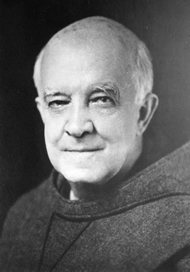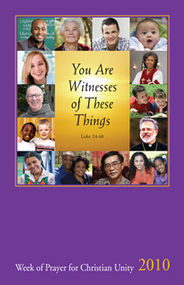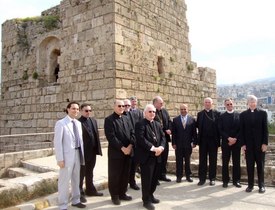 As bishop, I am told, you are asked to sit on boards and be a voice for causes that you may not have too much interest in or knowledge of. While to the new Archbishop Dolan’s portfolio as the archbishop of New York, he is the chairman of the board of the Catholic Near East Welfare Association (CNEWA) and is learning lots of new and beautiful things about the Church in other parts of the world. He made a recent trip to the Middle East with members of the governing board which opened his eyes to a new reality of what it is like to be an Eastern Christian. John Cardinal Foley, Grand Master of the Equestrian Order of Holy Sepulchre of Jerusalem accompanied the CNEWA board. The archbishop learned the beautiful horizons of the East and the limits thereof.
As bishop, I am told, you are asked to sit on boards and be a voice for causes that you may not have too much interest in or knowledge of. While to the new Archbishop Dolan’s portfolio as the archbishop of New York, he is the chairman of the board of the Catholic Near East Welfare Association (CNEWA) and is learning lots of new and beautiful things about the Church in other parts of the world. He made a recent trip to the Middle East with members of the governing board which opened his eyes to a new reality of what it is like to be an Eastern Christian. John Cardinal Foley, Grand Master of the Equestrian Order of Holy Sepulchre of Jerusalem accompanied the CNEWA board. The archbishop learned the beautiful horizons of the East and the limits thereof.
Category: Ecumenism
New Connecticut Episcopal bishop misleading
Reading my hometown newspaper, The New Haven Register, the editors ran a story about Connecticut’s 15th new Episcopal bishop, the Right Reverend Ian T. Douglas regarding his forthcoming ordination. I am sure for many the presence of Nobel peace laureate Archbishop Desmond Tutu will be a big “plus.” But there are aspects of the new bishop’s opportunistic thinking that raises concerns.
Spiritual Ecumenism and dialogue, Pope Benedict addresses the ELCA
Keeping up with Pope Benedict can be a difficult task, even for the strong; the pope does so much work in given week that most people would wilt. However, because he has such an excellent staff, much is possible. Key to understanding Benedict’s ecumenical work is his openess to collaborating with the Spirit and with others Chrisians for full visible communion desired by Christ and the Church, particularly since Vatican II. Additionally, his insistence on spiritual ecumenism is always noteworthy because without prayer none of ecumenical diagolue work makes a bit of sense. Plus, the pope raises the all-important matter of harvesting the fruit already done by the churches. So often we work hard on some document or event but fail to assess the fruit of the document or event to see what fruit there is and how it’s maturing. The lack of critical and honest engagement with the issues and the prudential enactment of the dialogue is fraustrating to lots of people. It is likely that many people have missed the news of of the Pope’s recent meeting with a delegation from the Evangelical Luthern Church in America (ELCA) on Wednesday, 10 February 2010, where he said (emphasis added):
“Since the beginning of my Pontificate, I have been encouraged that relations between Catholics and Lutherans have continued to grow, especially at the level of practical collaboration in the service of the Gospel. In his Encyclical Letter Ut Unuum Sint, my beloved Predecessor Pope John Paul II described our relationship as “brotherhood rediscovered” (n. 41). I deeply hope that the continuing Lutheran-Catholic dialogue both in the
I conclude by renewing the wish expressed by my Predecessor, during whose Pontificate so much was accomplished on the road to full visible unity among Christians, when he said to a similar delegation from the
Upon you and all those entrusted to your pastoral care, I cordially invoke the abundant blessings of Almighty God.
Bartholomew takes on critics of dialog, establishes Orthodox concern for Church unity
I’ve provided here excerpts of Bartholomew I’s Patriarchal and Synodal Encyclical, published on the Sunday of Orthodoxy (
Catholics have their own irrational critics of the ecumenical movement, but I think there is sometimes good reason for the ecumenical leaders to pay attention to thoughtful criticism. I think we have been saddled with misguided “ecumenists” who capitulate to others some substantial matters like the nature of truth, morals, the sacred Liturgy, dogma, ecclesiology, teaching authority, etc.
But with this patriarchal letter, Bartholomew sets the stage for thinking intelligently and faithfully in an effort to work toward unity among Christians, without which the Christian witness to Christ as Lord and Savior and the sacramentality of the Church is weakened. There are matters raised by the critics that need to be dealt with directly, like: To what end do the dialogues aim? Is full, visible unity possible, or are we wasting our time? Can a selective reading of history be set aside and real scholarship emerge to shed light on historical events and gestures and theological reflection? How do we discern the work of the Holy Spirit in the dialogues? Are truth claims made by the Churches (
Funny, this letter will be read by the Catholic world on the ancient feast of the Chair of Peter on who whose witness we rely on for Christian unity. Would that the irony might be an opportunity for more concrete expressions unity of life in Christ. What Bartholomew says of the Orthodox Church is applicable to the Roman Church. Emphasis is mine.
May Saint Peter and Saint Andrew with Mary, Mother of God, pray for us.
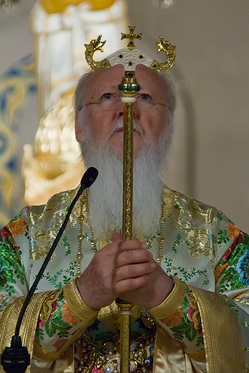 With a sense of duty and responsibility, despite its hurdles and problems, as the First-Throne Church of Orthodoxy, the Ecumenical Patriarchate cares about protecting and establishing the unity of the Orthodox Church, in order that with one voice and in one heart we may confess the Orthodox faith of our Fathers in every age and even in our times. For, Orthodoxy is not a museum treasure that must be preserved; it is a breath of life that must be transmitted and invigorate all people. Orthodoxy is always contemporary, so long as we promote it with humility and interpret it in light of the existential quests and needs of humanity in each historical period and cultural circumstance.
With a sense of duty and responsibility, despite its hurdles and problems, as the First-Throne Church of Orthodoxy, the Ecumenical Patriarchate cares about protecting and establishing the unity of the Orthodox Church, in order that with one voice and in one heart we may confess the Orthodox faith of our Fathers in every age and even in our times. For, Orthodoxy is not a museum treasure that must be preserved; it is a breath of life that must be transmitted and invigorate all people. Orthodoxy is always contemporary, so long as we promote it with humility and interpret it in light of the existential quests and needs of humanity in each historical period and cultural circumstance.
To this purpose, Orthodoxy must be in constant dialogue with the world. The Orthodox Church does not fear dialogue because truth is not afraid of dialogue. On the contrary, if Orthodoxy is enclosed within itself and not in dialogue with those outside, it will both fail in its mission and no longer be the “catholic” and “ecumenical” Church. Instead, it will become an introverted and self-contained group, a “ghetto” on the margins of history. This is why the great Fathers of the Church never feared dialogue with the spiritual culture of their age – indeed even with the pagan idolaters and philosophers of their world – thereby influencing and transforming the civilization of their time and offering us a truly ecumenical Church.
Today, Orthodoxy is called to continue this dialogue with the outside world in order to provide a witness and the life-giving breath of its faith. However, this dialogue cannot reach the outside world unless it first passes through all those that bear the Christian name. Thus, we must first converse as Christians among ourselves in order to resolve our differences, in order that our witness to the outside world may be credible. Our endeavors for the union of all Christians is the will and command of our Lord, who before His Passion prayed to His Father “that all [namely, His disciples] may be one, so that the world may believe that You sent me.” (John 17.21) It is not possible for the Lord to agonize over the unity of His disciples and for us to remain indifferent about the unity of all Christians. This would constitute criminal betrayal and transgression of His divine commandment.
It is precisely for these reasons that, with the mutual agreement and participation of all local Orthodox Churches, the Ecumenical Patriarchate has for many decades conducted official Panorthodox theological dialogues with the larger
These dialogues, together with every effort for peaceful and fraternal relations of the Orthodox Church with other Christians, are unfortunately challenged today in an unacceptably fanatical way – at least by the standards of a genuinely Orthodox ethos – by certain circles that exclusively claim for themselves the title of zealot and defender of Orthodoxy. As if all the Patriarchs and Sacred Synods of the Orthodox Churches throughout the world, who unanimously decided on and continue to support these dialogues, were not Orthodox. Yet, these opponents of every effort for the restoration of unity among Christians raise themselves above Episcopal Synods of the Church to the dangerous point of creating schisms within the Church.
In their polemical argumentation, these critics of the restoration of unity among Christians do not even hesitate to distort reality in order to deceive and arouse the faithful. Thus, they are silent about the fact that theological dialogues are conducted by unanimous decision of all Orthodox Churches, instead attacking the Ecumenical Patriarchate alone. They disseminate false rumors that union between the Roman Catholic and
Beloved children in the Lord, Orthodoxy has no need of either fanaticism or bigotry to protect itself. Whoever believes that Orthodoxy has the truth does not fear dialogue, because truth has never been endangered by dialogue. By contrast, when in our day all people strive to resolve their differences through dialogue, Orthodoxy cannot proceed with intolerance and extremism. You should have utmost confidence in your
Paul Wattson: RIP 70 years
Some words by Father Paul Wattson
up and kindle within us, is the gift of our Lord himself to us in the Blessed
Sacrament. That is the very heart and center of the religious life. It is our
exceedingly great privilege to
have come out of the world and assemble ourselves in the religious houses,
where we practically live under the same roof with our heavenly bridegroom.
a most intimate manner we receive Him every morning in Holy Communion. When we
receive our Lord in Holy Communion, we receive God’s body, blood, soul and divinity,
the whole Christ, entering our lips and penetrating the inmost recesses of our heart
even as he said, “He that eats my flesh and drinks my blood, abides in me
and I in him.” [John 6:56] Consequently our life is a life of most intimate
union. Our divine Savior would not only have us live under the same roof with
him and dwell in our chapels, which are for the time being a part of the court
of Heaven, but he enters into our interior and penetrates our whole being and
lives in us in this wonderful union. And all this is the fruit and the result
of the Blessed Sacrament. Therefore, we should have a most wonderful devotion
to the Holy Eucharist. (Father Paul Wattson, SA, Retreat Conference August 19, 1926)
remembrance of Father Paul Wattson from a 2009 Communio
blog entry.
Anglicans coming to Rome? Why? … Here’s your answer
If you want to know the reasons why the bishops and vicars of the Traditional Anglican Communion petitioned the Holy Father for full communion –which led to the motu proprio for the Anglicans (given on Nov. 4, 2009), then read their October 2007 letter. The It was recently published by a blogger of Anglo-Catholic sensiblities. Here it is…
Pope urges the Church to take seriously prayer for COMPLETE unity among Christians
Speaking of the Week of Prayer for Christian Unity, which begins today and lasts until the 25th, the Pope talked about the value of the prayer initiatives for the Week at the Sunday Angelus Address:
propitious time to revive the ecumenical spirit, to meet each other, to get to
know each other, to pray and reflect together. The biblical theme, taken from
the Gospel of St. Luke, echoes the words of the risen Jesus to the apostles:
“You are witnesses of these things” (Luke 24:48). Our proclamation of the
Gospel of Jesus will be much more credible and effective the more that we are
united in his love, as true brothers. Thus, I invite parishes, religious
communities, ecclesial movements and associations to pray unceasingly, in a
special way during Eucharistic Celebrations, for the complete unity of
Christians.
The condition of our Catholicism is unity among Christians
Lord, pour out upon us the fullness of your mercy, and
by the power of your Spirit remove divisions among Christians. Let your
Church rise more clearly as a sign for all the nations that the world may be
filled with the light of your Spirit and believe in Jesus Christ whom you have
sent, who lives and reigns with you and the Holy Spirit, one God, forever and
ever. (from the Mass for Unity of Christians)
…image of the shepherd and that of the fisherman issue
an explicit call to unity. “I have other sheep that are not of this fold; I
must lead them too, and they will heed my voice. So there shall be one flock,
one shepherd” (Jn 10:16); these are the words of Jesus at the end of his
discourse on the Good Shepherd. And the account of the 153 large fish ends with
the joyful statement: “although there were so many, the net was not torn” (Jn
21:11). Alas, beloved Lord, with sorrow we must now acknowledge that it has
been torn! But no – we must not be sad! Let us rejoice because of your promise,
which does not disappoint, and let us do all we can to pursue the path towards
the unity you have promised. Let us remember it in our prayer to the Lord, as
we plead with him: yes, Lord, remember your promise. Grant that we may be one
flock and one shepherd! Do not allow your net to be torn, help us to be
servants of unity! (Pope Benedict XVI, Homily for the Beginning of the Petrine
Ministry, 2005)
Turkey can’t be trusted
The same old problems can’t be resolved in Turkey between the Turkish government and the Orthodox Church. Since 1971 the Halki Orthodox School of Theology (which operated within the guidelines of the Turkish department of education in the running of a high school and college/seminary) has been closed under specious claims.
Archbishop of Canterbury to deliver annual Schmemann Lecture at St. Vladimir’s Seminary
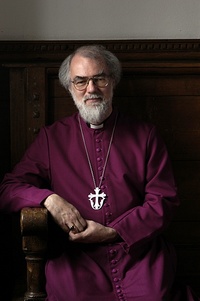 The Most Reverend Rowan Williams, Archbishop of Canterbury will be lecturing in Yonkers, NY, on Saturday, 30 January 2010, 12:30 p.m.
The Most Reverend Rowan Williams, Archbishop of Canterbury will be lecturing in Yonkers, NY, on Saturday, 30 January 2010, 12:30 p.m.
Calling: The Image of Humanity in the Philokalia.”
